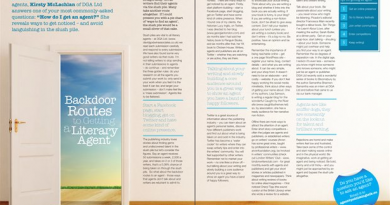5 things you need to know about agency agreements
 Don’t get too carried away with excitement and gratitude when an agent offers to represent you. Now is the time to put on your business hat and look out for these common pitfalls with agency agreements, says Kirsty McLachlan.
Don’t get too carried away with excitement and gratitude when an agent offers to represent you. Now is the time to put on your business hat and look out for these common pitfalls with agency agreements, says Kirsty McLachlan.
This article first appeared in issue 4 of Publishing Talk Magazine.
[rt_reading_time label="Reading Time:" postfix="minutes" postfix_singular="minute"]
Hurrah! An offer of representation from a top agent has been made. Do you really need a contract with them? Surely a handshake is fine? Being an author also means donning a business hat sometimes, and ensuring that you and your work are protected. There are snakes out there in the jungle and are best avoided.
As agencies all differ – and so do agency agreements. There are good and bad agreements. Sadly, in the throes of excitement, some writers are blinded to the corrupt nature of some agency agreements. I’ve seen several agreements over the years which have tied an author up in knots even when they have tried to leave an agent. So beware!
5 things you need to watch our for with agency agreements
The following is not an exhaustive list and every agency agreement differs.
1. Payments
All monies should be paid through to the author within 30 days of receipt by the agent (although many agents will agree to 14 days of receipt). There may be some bank charges – especially in the case of foreign payments – but the agreement should state clearly that the author will be charged for these, if that is the case.
It’s not standard practice for an agent to charge any further costs. Yet many agents do include charges for photocopying (although these should be minimal), purchase of extra copies for submissions etc. You need to be very clear what deductions will be made and whether or not you get approval over these charges prior to the costs taking place. It’s a sticky matter but I feel, given lots of submissions can be made by email these days, the days of huge postage costs have gone so there is less of an argument for agents to deduct costs.
There should be no upfront fees – reading fees or advance payments – which the author has to make to the agent. Ensure that your agent doesn’t suggest a ‘book doctor’ or ‘editor’ who has a relationship with the agent.
Agency agreements should state the commission that will be taken by the agent. This can range between 10%-20%. It could be a flat 15% for all income, or could have different percentages for income from different sales.
2. Submissions
You should be notified of each submission. You wouldn’t have approval of the submission, but its general practice for you to be consulted.
Any agreement with a publisher should always be subject to the approval of the author. You will be the signatory – unless agreed otherwise – of every agreement.
3. Don’t give your agent power of attorney
Agents shouldn’t be able to sign contracts on your behalf. There are exceptions to the rule – such as if you are out of the country a lot but think hard before agreeing to this. And, again, there should always be some kind of letter expressing this right.
Ensure that you’re not granting the agent the rights to a certain book. I’ve seen cases where an author has left an agent but that agent in question still holds rights to a book. To untie the rights at that point is a difficult matter. So ensure that the agent does not have any ongoing rights over a book unsold – or rights such as film rights or foreign translation rights to a book the agent has worked on, on behalf of the author.
4. Termination
What happens if, for whatever reason, the relationship between the agent and the author doesn’t work out? You need a get out clause, and this is called the termination clause. Make sure you are clear about the timeframe. Generally this is between one month and three months notice (following the letter of termination from either party). Any contract negotiated by the agent will stay in place and they will continue to receive commission on those contracts. This is a standard point but one worth understanding. No contract can be altered without the agent’s agreement.
An example of wording for a termination clause is as follows:
This arrangement may be terminated by either party to this agreement by not less than one month’s notice in writing. In the event that this Agreement is terminated, for whatever reason, both parties shall honour all existing Agreements. Any amendments to such Agreements shall only be made with prior written approval of both parties.
5. Non-assignment
Agencies are businesses and can be bought and sold. If you have agreed to be represented by one agency, how would you feel about being sold as an ‘asset’? A non-assignment clause can stop this and will simply state that the agency cannot assign the rights to the agreement to a third party. This is not a standard clause but one I feel important, as more and more agencies are bought up or are joining forces.
The Agency shall not assign their role as Agent – which shall include any services rendered or to be rendered – under any agreement or any part of any agreement made by the Agency to a third party without the Author’s prior written consent.
Finally, don’t forget that both parties then need to sign and date the agreement
Finding an agent is a delight, but you need to feel completely happy with them – both on a business level and a personal one. Meet the agent, ask any questions you want to ask – however, small or seemingly crazy. Take your time to make the right decision and hopefully it will be a long-lasting relationship.



